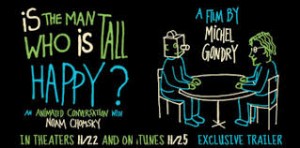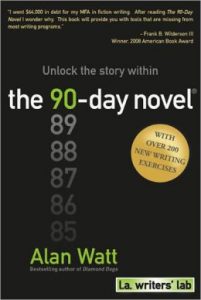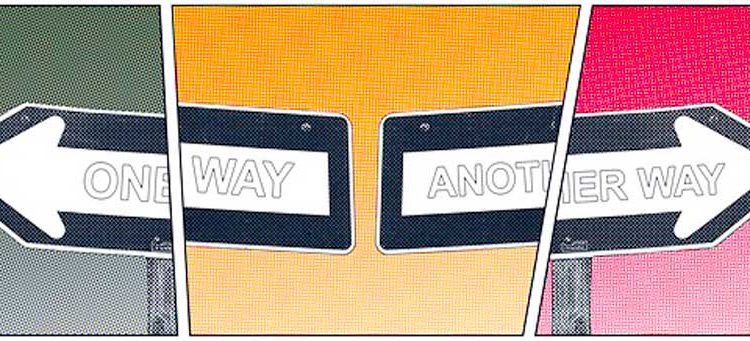Recently I had a ‘New Year’ conversation with a good friend. Our talk turned to Noam Chomsky and his film, Is The Man Who Is Tall Happy?, an animated documentary  on the life of the linguist, philosopher, and political activist by French filmmaker Michel Gondry. (It is, btw, a delightful and provocative film.) Chomsky had been an early influence in my friend’s academic life. We touched briefly on Chomsky’s atheism and his belief in (I paraphrase) the “big nothing” that follows death.
on the life of the linguist, philosopher, and political activist by French filmmaker Michel Gondry. (It is, btw, a delightful and provocative film.) Chomsky had been an early influence in my friend’s academic life. We touched briefly on Chomsky’s atheism and his belief in (I paraphrase) the “big nothing” that follows death.
 on the life of the linguist, philosopher, and political activist by French filmmaker Michel Gondry. (It is, btw, a delightful and provocative film.) Chomsky had been an early influence in my friend’s academic life. We touched briefly on Chomsky’s atheism and his belief in (I paraphrase) the “big nothing” that follows death.
on the life of the linguist, philosopher, and political activist by French filmmaker Michel Gondry. (It is, btw, a delightful and provocative film.) Chomsky had been an early influence in my friend’s academic life. We touched briefly on Chomsky’s atheism and his belief in (I paraphrase) the “big nothing” that follows death.The topic of what comes after—nothing or something—tugged at me more than usual, due I think, to winter’s dark days and long, cold nights, new relationship commitments, the holidays-with-book-deadline, my ex-husband’s marriage to his new partner, and the fact that my daughter, who is 15-going-on-30, seems to be growing up at the speed of light.
But—because I am a writer of fiction and not a philosopher—I quickly moved our conversation away from the “big nothing” to focus on the countless small deaths we each experience in a lifetime. By “small deaths” I mean the dilemmas we face—a dilemma being an impossible problem, one that cannot be solved. The only solution to a dilemma is self-transformation, and transformation comes about when we are able to change the way we view the world, so the old way of seeing is dead and a new way is born.
Dilemmas drive the turning points in our lives; they also drive our stories, whether they are comedies or dramas.
Best-selling author and creative writing teacher Alan Watt:
“At the heart of every story is a dilemma. If we’re not sure what our story is about, let’s consider this for a moment: Problems are solved while dilemmas are resolved through a shift in perception.”
 I happened to pick up Watt’s book, The 90-Day Novel in the fall of 2010, when my daughter was turning seven. I had just heard a book deal I’d worked on for more than a year seemed to be dead in the water. A week later, while I lay in bed next to my husband, he announced that he couldn’t be married anymore and he was leaving. He added, quite coolly, that we could share custody of our daughter fifty-fifty. After that miserable night, the sun rose as usual, and we somehow managed to get our daughter to school without her knowing how much our world had changed.
I happened to pick up Watt’s book, The 90-Day Novel in the fall of 2010, when my daughter was turning seven. I had just heard a book deal I’d worked on for more than a year seemed to be dead in the water. A week later, while I lay in bed next to my husband, he announced that he couldn’t be married anymore and he was leaving. He added, quite coolly, that we could share custody of our daughter fifty-fifty. After that miserable night, the sun rose as usual, and we somehow managed to get our daughter to school without her knowing how much our world had changed.And I began the fight to hold the family together.
I refused to accept what I knew to be true: the marriage was broken beyond repair (we’d both been unhappy for years). I dragged my then-spouse to marital therapy (one session and it became divorce therapy). I begged, pleaded, stopped eating and kept up an insane work schedule—and got through the days with the help of manic spin classes and anti-anxiety meds.
This is how I saw it:
At all costs I had to keep the family together.
I could not survive giving up my daughter half of the time.
I would not admit the day was fast approaching when we would break the news to her.
She could not bear another disruption of attachment—she is adopted and she spent most of her first year in an orphanage.
I could not/would not let go of my dream of our family.
I was desperate to hold onto a badly broken marriage in order to keep my family together in order to provide my daughter with a happy, stable family…well, you see the impossible logic for an insoluble problem.
Our divorce therapist quietly told my husband his job was to own his anger and step up to the plate; my job was to see the truth in front of me.
But I had seen the truth—I’d seen it for a very long time—and I’d intentionally blinded myself to it because we shared a child.
But the force of truth eventually pushed me kicking and screaming toward the inevitable day—I’d have to say one of the worst of my life—when we broke the news to our daughter that we were separating. She blanched and cried out. And then she crumpled into tears.
That night the three of us lay down on her bed. She fell into a fitful sleep. My husband left. I don’t think I slept at all. When my daughter woke the next morning, she reached for me and said, “Mama, I remember, and I know it wasn’t a bad dream.”
A part of me died that day.
Another part stepped up—I knew I would fall apart many times over the next year. But I would also hold it together and work with my husband and we would do what was best for our daughter. I’d reached a point of surrender—and we all began to slowly, sometimes agonizingly, build a new way of defining “family”. We began to heal.
I share this personal history because it is the experience in my life so far that has taught me the most about writing meaningful stories. It showed me (seared through me) how desire, life and death stakes, dilemma, all-out struggle, surrender and transformation are the forces at the heart of our lives and our stories.
Needless to say, reading The 90-Day Novel and Watt’s precise analysis of dilemma and the force it exerts in life – and in memorable fiction – hit home for me that fall.
To quote Alan Watt once more because, for me, he has caught what is at the heart of story:
“When we recognize that our hero does not have a problem, but rather a dilemma, our story begins to wake up. If our hero has an impossible problem, how the hell are we going to solve it?
We’re not. And neither is he. He’s going to surrender. He’s going to re-frame his relationship to what he wants and in doing so, he is going to begin to work with the reality of his situation.”
Desire, dilemma, life and death struggle, surrender and transformation—the heroes of our best stories will walk through fire to reach a new way of being in the world.
And after all that? Maybe the “big nothing” or the “after life” or…I leave that to you.



Sarah,
Your story moved me to thughtful reflection on the abounding changes which have brought me to where I am. “Desire, dilemma, life and death, struggle surrender and transformation” are in all the stories I hear as a therapist daily. They awaken me and guide me in making a “new way of being in the world”.
Thank you for sharing yourself.
Love, Marcie
Thank you so much, Marcie, for your lovely comment and for all the wonderful work you do guiding others through the often challenging journey of transformation. Love, Sarah